Tables for one - the rise of solo dining
- Published
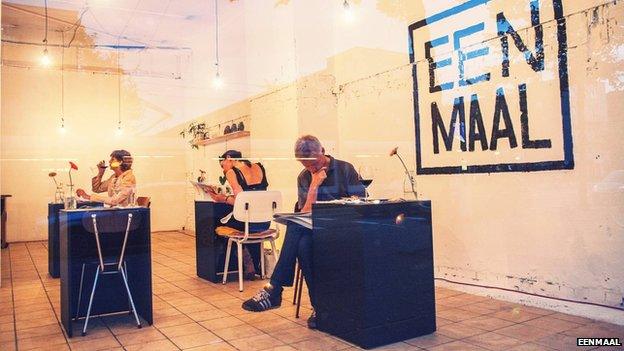
Amsterdam restaurant Eenmaal only has tables for one
Not too long ago solo dining was synonymous with a greasy takeaway scoffed down in the car, or room service consumed in the sterile anonymity of your hotel room.
This was preferable to the thought of dining alone in a proper restaurant, and the associated stigma of being seen as a "friendless loser".
Some of that sense of unease surrounding booking a table for one no doubt dates back to our childhoods, when sitting alone in the high school cafeteria was tantamount to social suicide.
Yet today, a growing number of us live alone - including one out of every seven adults in the US - so the stigma surrounding solo dining has started to dissipate, says Aaron Allen, a Florida-based global restaurant consultant.
With more and more people choosing to dine out alone, Mr Allen says savvy restaurants around the world are trying to make themselves more welcoming to solo diners, for example by fitting more bar seating, or encouraging waiting staff to be more attentive to customers sitting on their own.
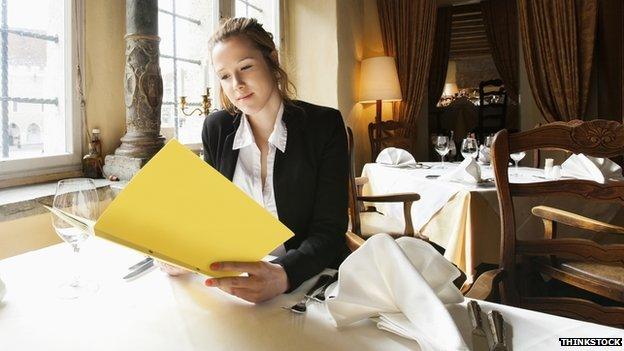
Is there still some stigma attached to dining out on your own?
Lunch on the house
Ottawa restaurateur Stephen Beckta says fine dining establishments should see a solo diner as "the greatest compliment a restaurant can receive".
His three restaurants - Beckta, Play and Gezellig - are magnets for solo diners in the Canadian capital.
In addition to having the extensive bar seating and thoughtful service that restaurant experts such as Mr Allen highlight, Mr Beckta's three outlets also enable solo diners to busy themselves with tasting menus of up to eight small courses.
Mr Beckta says: "Solo diners choose to eat with us for the pleasure of dining - not because they were roped into a celebration or a date - so why would we not embrace them?"
And while his staff are happy to have a good chat with people dining on their own, he says guests can request to be left alone.
"If you're a solo diner, my suggestion is to ask for the things that are going to make you happy," says Mr Beckta.
"A table out of the way? A seat at the bar? In conversation or left alone? A good restaurant wants to make you happy."
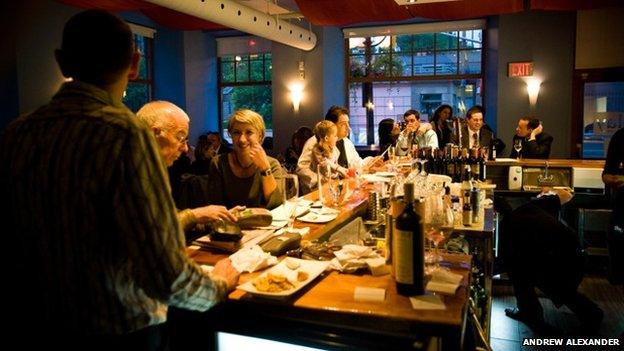
Solo diners at Stephen Beckta's three restaurants can sit at a bar counter and talk to staff and fellow diners
Mr Beckta's love for solo diners also goes as far as his three eateries offering a free lunch to guests who have booked a date reservation for two, only to find themselves stood up.
"How else would you want to turn around their experience if not to take care of their bill?" he says.
But do any diners pretend to have been stood up just so they can get a free meal?
"We've never had anyone try to take advantage of our policy, though we don't extensively advertise it," Mr Beckta says.
"We just trust our customers, and have found that if you do the right thing by them, they'll take care of you in return."
Purchasing power
Aaron Allen says there are a number of societal reasons behind the growth in the number of solo diners.
"Divorce rates are higher, and people are waiting longer before getting married," he says.
"[As a result], there are way more singles in the marketplace, and they're much more affluent in terms of what they spend on food and living expenses."
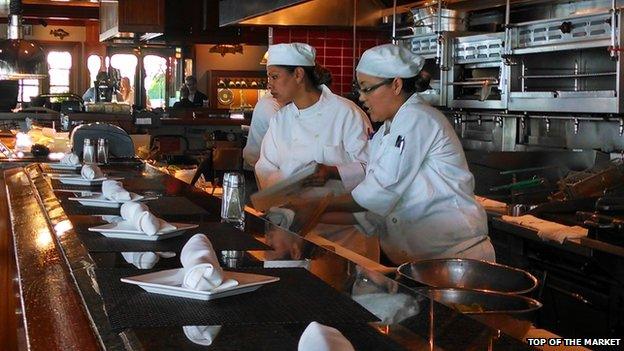
Chefs at the Top of the Market restaurant are encouraged to chat to people dining on their own
Official figures confirm that the purchasing power of single people is vast, with the Bureau of Labor Statistics calculating that singletons in the US spend $1.9 trillion (£1.1tn) per year.
In London almost a third of homes are now occupied by just one person, while in New York and Paris it is more than half. And in cities such as Stockholm, 60% of residents live on their own.
While most of these people do of course go out for meals with friends and relatives, many are also increasingly choosing to book tables for one.
Provide a show
At the San Diego restaurant Top of the Market, executive chef Ivan Flowers was brought in last year to make some changes, with one main aim being to increase the number of people dining alone.
He felt that while the eatery already had bar seating in front of the open kitchen, it was underutilised because the chefs weren't interacting enough with the customers.
Mr Flowers says solo diners sitting by the kitchen now get "to see a show", which includes cooking demos, free tastings and conversations with the chefs.
"If you catch our eye, we'll ask, 'Would you like to try that?'
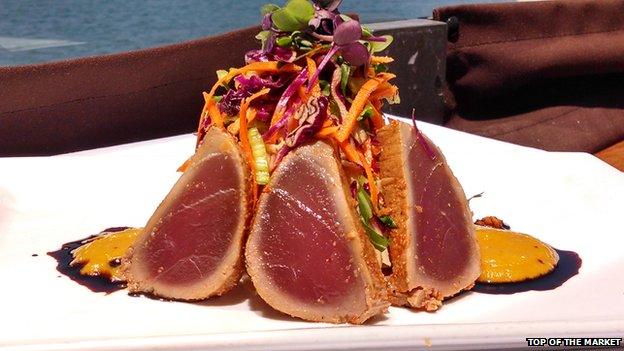
Dining alone at least means that no-one asks if they can try your food
"Our solo diners love watching professional cooking at that level and speed. When there's a pause, they'll start asking questions like 'I made this the other day, how can I prevent it from burning?'
"We'll take their email to load them up with the information [they are after]. We do whatever it takes to make it a memorable night.
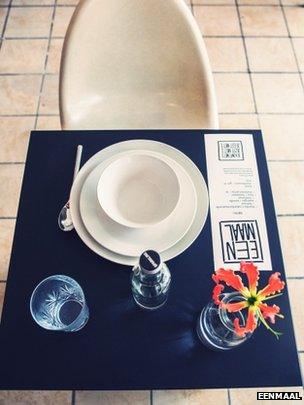
Solo diners in London will soon be able to dine out at an Eenmaal restaurant
"Our solo customers forget they are alone - because they've never been alone from the moment they stepped in."
Deliberate disconnection
Yet for those solo diners who do actually want to feel alone, there's Eenmaal, a pop-up restaurant in Amsterdam that features only tables for one.
Created by Dutch designer Marina van Goor, the restaurant has been fully booked every night since it opened last summer. Sister branches will be opening in Antwerp, London, Berlin and New York later this year.
Ms van Goor says: "I noticed that in our society, there is no room for being alone in a public space, unless you are going somewhere.
"I wanted to create an attractive place where disconnection is okay, especially in our hyper-connected society.
"I chose to set up a restaurant, because eating alone is the most extreme form of feeling disconnected in our culture."